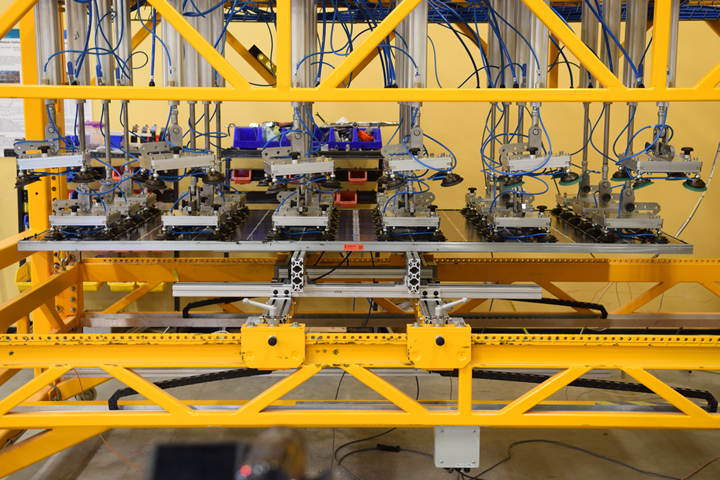Origami Solar Announces Results of Third-Party Testing of Steel Solar Module Frames

After months of rigorous, independent testing at CFV Labs and the Renewable Energy Test Center (RETC), Origami Solar announced that modules incorporating Origami’s steel module frames passed frame-related industry-standard tests required to support module maker certifications, including those of the International Electrotechnical Commission (IEC), specifically IEC 61215 static mechanical load testing and IEC 61701 salt-mist corrosion testing and continuity testing of equipotential bonding.
This testing proves that module manufacturers considering switching from imported aluminum frames to domestic steel frames can pass certification testing with no concern.
CFV ran both required static load testing and optional test-to-failure tests. In the static mechanical load tests, modules using Origami’s steel frames comfortably met the standards demanded for IEC module certification. On a tracker with 400mm bolts, the modules passed the IEC 61215-specified sequence of three cycles of one hour of down push pressure and one hour of uplift pressure at pressure levels of +/- 2400 Pa. When using quarter point clamps along the module long side, with racking below the module, the modules passed the same cycle times but with down push pressure of 5400 Pa and uplift pressure of 3000 Pa. The modules comfortably passed all static mechanical load tests, meeting the IEC 61215 standard requirements.
While modules using Origami steel solar frames passed the required IEC 61215 tests, the test-to-failure runs further proved that the steel frames provide an ample safety margin, giving module makers further peace of mind. In fact, during some trials, even the maximum pressure allowed by CFV did not result in module breakage, which is important given the solar industry’s growing issue with decreased module strength.
“Over the last five years, CFV Labs has identified a decrease in module strength, both in laboratory testing and in fielded module projects,” said Colin Sillerud, Vice President of Engineering at CFV Labs. “The steel-frame modules supplied by Origami to CFV for testing exhibited test-to-failure pressure values that were higher than similarly sized and constructed modules with aluminum frames. While CFV cannot say that laboratory tests translate directly to field performance, these results show a strong relative lab performance when compared to traditionally framed PV modules.”
RETC’s salt mist corrosion and continuity testing on modules using Origami’s steel solar frames demonstrated similarly successful results, confirming the significant corrosion protection performance of zinc-aluminum-magnesium coatings (Z-A-M). Given the years of lab and real-world testing that the steel industry has put Z-A-M-type coatings through, and its field deployment across a range of industries, there was little question that modules using Origami steel solar frames would pass salt mist corrosion testing. The test module underwent the most rigorous of the salt mist testing methods typically used for land-based solar (specifically, IEC 61701, Method Six) and passed, correlating to the highest land-based corrosivity category, C5. The testing sequence also included testing for continuity bonding both pre-and-post salt mist sequence, which the test module framed with Origami’s steel passed with no issues.
“As our modeling predicted, Origami steel module frames demonstrated excellent performance across the full range of certification tests,” said Lauren Ahsler, Vice President of Engineering, P.E., S.E., at Origami Solar. “The tests prove to the industry that there is minimal risk to module makers’ ability to get modules certified when they switch to steel solar frames. These rigorous, third-party tests also show that switching to steel module frames has the potential to address the decrease in allowable loading specifications for large format modules and to improve overall PV plant reliability. The steel frames’ excellent performance in the salt-spray test sequence should resolve any concerns about corrosion protection. This independent testing demonstrates that Origami’s steel solar frames represent a big step forward for the solar industry.”
A detailed test plan is available here: https://origamisolar.com/test-program-doc-download/
Origami Solar is the only developer of an innovative steel solar panel frame that is transforming the solar industry with a transparent, domestic recycled steel supply base, precise high-speed production, and dramatically lower greenhouse gas emissions. By sourcing steel from an established regional ecosystem, solar module manufacturers can eliminate supply chain risk, decarbonize their modules, and qualify for important domestic content incentives. Origami’s experienced leadership team has successfully developed utility-scale solar projects, commercialized PV components, and launched and scaled several renewable energy companies.
CFV Labs is an independent third-party PV test and research lab located in Albuquerque, NM. CFV Labs provides performance and reliability testing to the PV industry, including mechanical load testing and hail testing for tracker, racking and module manufacturers and developers.
Comments (0)
This post does not have any comments. Be the first to leave a comment below.
